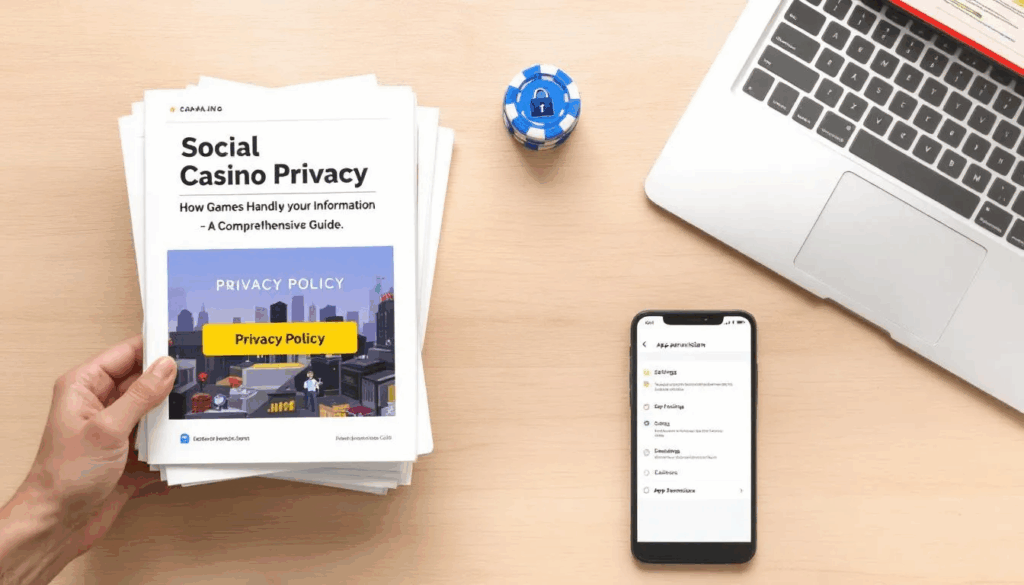Social Casino Privacy
Social casino games have exploded in popularity over the past decade, offering players the thrill of slots, poker, and roulette without the risks of real-money gambling. From Facebook apps to mobile downloads, these platforms attract millions of users daily, often using their mobile devices. Platforms like the Sixty6 sweepstakes social platform illustrate just how engaging this form of entertainment has become. But while the stakes may not involve cash winnings, another currency is always in play—your data. The way these platforms handle information has become a growing concern for players worldwide. In this comprehensive guide, we’ll explore the core aspects of social casino privacy, including what data is collected, how it’s used, and how players can better protect themselves.
Understanding Social Casino Games
Social casino platforms are designed for entertainment, not profit. Players use virtual coins, chips, or tokens instead of real money, making them accessible to a broad audience, including those who might never step foot in a traditional casino. Unlike online gambling, social casinos are typically free-to-play with optional in-app purchases for extra credits or features.
However, the absence of real-money wagering doesn’t mean these games are risk-free. Since most social casinos are integrated with social networks or mobile platforms, they are often accessed via mobile devices and mobile applications, as well as other software applications. These platforms also operate through various online services. They gather vast amounts of data and also collect information through their online services to personalize and enhance the user experience. This creates privacy challenges that are often underestimated by casual players.
Why Privacy Matters in Social Casino Gaming
Every time you spin a reel, send a gift to another player, or purchase bonus tokens, the platform is collecting data. This includes personal information, as platforms collect personal information, including financial account information, for various purposes such as improving services, complying with legal requirements, and marketing.
Privacy matters for several reasons:
- Data misuse – Personal and behavioral data, including personal information, can be used for aggressive marketing or shared with third parties. Such information may also be used for direct marketing purposes.
- Manipulation – Algorithms can use your gaming patterns to nudge you into spending more money or playing longer.
- Transparency issues – Many players don’t realize the extent of what they agree to when they click “Accept” on privacy policies.
The idea of social casino privacy extends beyond anonymity—it’s about knowing how your digital footprint is being tracked, analyzed, and monetized, and how such information is managed and disclosed.
Types of Data Collected by Social Casino Platforms: Including Device Information
Social casinos rely heavily on user data to fuel personalization and monetization. The most common categories include:
- Personal identifiers: Name, email, and often social media login details. Players who sign up through Facebook or Google may unknowingly grant access to their contact lists and friend networks.
- Behavioral data: Game preferences, session length, number of daily logins, and purchase history. This information helps developers refine in-game offers.
- Device and technical data: Device information such as IP address, location, operating system, device type, browser type, and traffic data. These details allow the platform to optimize performance but can also be used for targeted advertising.
- Additional data types: Transaction information, postal address, telephone number, financial information, and administrative information may also be collected for identity verification, payment processing, and security purposes.
Platforms also collect information using pixel tags, similar technologies, and other data sources to gather statistical information, analyze user behavior, and process other data relevant to service improvement.
Understanding what’s collected is the first step toward better social casino privacy management.
How Social Casino Operators Use Your Data with Third Party Service Providers
The collected data isn’t just stored; it’s actively used to shape your experience and the company’s revenue strategy. Platforms use data analysis and data analytics to understand usage trends and improve their ability to provide transaction information and services and requested services:
- Game personalization – Algorithms adjust rewards, bonuses, and offers to suit your playing style. For example, if you tend to log in at night, special promotions may appear during those hours.
- Advertising – Social casinos generate significant revenue from ads. Your data enables hyper-targeted campaigns that follow you across apps and platforms.
- Monetization strategies – Insights from play behavior help developers design offers that maximize spending potential, from “limited-time bonuses” to daily reward streaks.
- Community engagement – Many platforms integrate social features, encouraging interaction with friends. These connections often involve data sharing with other users and third-party apps, and related customer service and other services may involve sharing data with business partners, third party service providers, and third party services.
- Loyalty programs – Loyalty programs and the loyalty program are used to collect data, personalize offers, and enhance customer retention.
Platforms may also disclose information to third parties and retain data for specific periods in accordance with their data retention policies.
Risks and Challenges to Player Privacy
While some of these practices enhance gameplay, they also pose risks:
- Data breaches: A single hack can expose millions of player accounts, including email addresses and payment details. Robust security measures are essential to prevent identity theft and unauthorized access.
- Third-party tracking: Advertisers often use cookies and trackers that extend far beyond the game itself. Platforms may also use Google Analytics and collect other traffic data to track and analyze user interactions.
- Over-profiling: By analyzing behavior, platforms can predict spending habits and exploit psychological triggers.
- Opaque policies: Privacy policies are usually lengthy and vague, making it difficult for players to fully understand how their data is being handled.
Platforms must comply with legal obligations, applicable laws, and applicable law, and may be required to share certain services and personal data with government authorities in response to official requests or investigations. Secure payment processing is critical for protecting user transactions, and clear procedures should be in place for users who lose access to their accounts, such as PIN resets or account recovery.
The convenience of free gaming should never overshadow the need to safeguard social casino privacy.
How to Protect Your Privacy While Playing
Players aren’t powerless. A few smart habits can make a big difference in protecting personal data:
- Use strong, unique passwords: Avoid reusing the same password across multiple platforms.
- Limit social logins: Instead of signing in with Facebook or Google, use email registration when possible.
- Check app permissions: On your mobile device, review and manage permissions for push notifications and SMS messages to control what communications you receive from the app.
- Enable privacy settings: Many platforms allow you to opt out of targeted ads or adjust what data is visible to friends.
- Consider a VPN: Virtual private networks can mask your IP address, reducing tracking by advertisers.
By taking these steps, players reinforce their own social casino privacy even when platforms fall short.
Industry Trends: Moving Toward Transparency

A typical privacy statement describes what personal data is collected, how it is used, shared, and protected, as well as the rights users have regarding their information.
Forward-thinking developers are also beginning to adopt privacy-first designs, offering clearer user controls and limiting third-party data sharing. While not universal yet, this trend suggests a positive shift toward accountability in the way social casinos manage privacy.
What to Look for in a Safe Social Casino App: Key Security Measures
Not all platforms are equal when it comes to privacy. Players should prioritize apps with clear terms regarding promotional campaigns :
- A transparent privacy policy that explains what’s collected and why.
- Opt-in/opt-out options for marketing emails and personalized offers.
- Secure payment systems for those who choose to make in-app purchases.
- Positive user reviews that highlight safe and trustworthy practices.
- Clear disclosure of website hosting arrangements and how data is shared with any linked site or other services.
Reputable platforms are also transparent about their use of social media platforms and social media pages for communication and engagement.
Choosing wisely is part of protecting your social casino privacy.
Social casino games offer fun, community, and a taste of the casino experience without the risks of real-money gambling. But while the financial stakes are low, the privacy stakes are high. From personal identifiers to behavioral tracking, the information collected can shape not just your gaming experience but also your digital identity across the web.
Players who take proactive steps—such as limiting app permissions, adjusting privacy settings, and choosing transparent platforms—can enjoy the thrill of social casinos while keeping their data safe, especially in the context of internal investigations . At the same time, developers who prioritize transparency and ethical data practices are more likely to earn long-term trust.
In the end, protecting social casino privacy is a shared responsibility between players and platforms. Users should also be aware of how their data may be transferred during a business transaction, such as a merger or acquisition. For those interested in exploring how these games compare with other forms of digital play, this guide on social casinos vs online casinos provides valuable insights. By staying informed, you can spin the reels with confidence, knowing you’re in control of more than just the game.



More Stories
How the Super Bowl Quietly Changed Online Casinos
5 Dog Food Options to Consider Before Switching Diets
5 Portable Grill Benefits for Outdoor Cooking